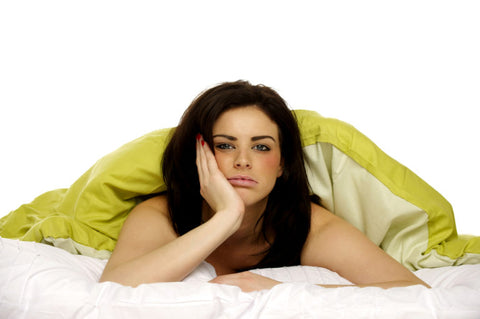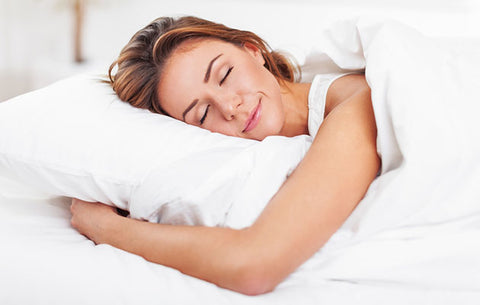Including a question and answer section with award-winning health writer and GP, Dr Sarah Brewer
Sleep Problems: Difficulty Sleeping is Common
Just about everyone experiences sleep problems at some time during their life – often when they’re feeling worried or stressed. It may last just a few days (eg jetlag) or a few weeks (eg exam stress) but when it is due to anxiety, sleep difficulties can last for several weeks.
What are sleep problems?
Sleep problems or sleep disturbance is the perception of difficulty falling asleep, or in staying asleep, and the feeling that you are not getting enough. You may wake up earlier than you would like, or the sleep you do achieve is not refreshing. Research suggests that one in three people is affected by sleep problems.
Did you Know?
People aged 60 and over tend to sleep 1.5 hours less per 24 hour period than younger adults aged 30 and below.
Why You Need Restorative Sleep?

Sleep is so essential for your physical and mental well-being that you spend around a third of your life in bed! Sleep is actually a form of unconsciousness in which some parts of the brain switch off, but others become more active.
While you are asleep:
- Your brain processes information, memory and experiences
- Your muscles and joints recover from constant use during the day
- You produce increased amounts of growth hormone
- Protein in all parts of your body is replenished faster than when you are awake
- Your production of skin cells, red blood cells and immune cells increases
Sleep problems are an important well-being issue

Lack of sleep has a significant effect on your quality of life. When you suffer from sleep disturbance, you wake up feeling tired and irritable, and may not feel that you are performing at your best.
Achieving just the right amount of sleep seems to be very important for long-term health and well-being.
Did you Know?
Females tend to sleep longer than men up to around the age of 55.
Counting Sheep ….
You want to aim for achieving a good sleep efficiency. This is the ratio of the total time you spend asleep at night, divided by your total time in bed.
Time asleep
Time in bed
If you fall asleep soon after going to bed, and snooze throughout the night, you have high sleep efficiency (eg 90%). If you toss-and-turn, finding it difficult to nod off, or wake several times during the night, however, you have a low sleep efficiency (eg 70%).
A good way to help you fall asleep is to concentrate on something that occupies your brain and blocks out the thoughts which often keep you awake. Counting sheep is one of the most popular ways of doing this. Don’t count hyperactive, bouncy sheep jumping over a fence, though – count fluffy sheep in a flock, contentedly munching or snoozing quietly on the grass.
Does sex help you sleep?
It’s thought that sexual activity increases the need for sleep, and can help you doze off. Surprisingly this has not really been studied.
Can you have too much sleep?
An abnormally high sleep efficiency of greater than 95% is typically seen in people with excessive sleepiness (hypersomnia).
Frequently asked Questions

Dr Sarah Brewer qualified as a doctor from Cambridge University. After working in general practice and sexual health, she now specialises in health communication and is an award-winning health writer.
Q. I suffer from panic attacks which keep me awake. Can anything help me deal with situations better, so I can relax?
A. Panic attacks are usually linked with over-breathing, so you breathe out too much carbon dioxide gas. This makes your blood more alkaline and affects the messages travel through your nervous system, leading to symptoms such as pins-and-needles, dizziness and feelings of panic. If you find yourself breathing quickly, or feel panic rising, try to slow your breathing – breathing in and out of your cupped hands (or the traditional brown paper bag) helps you breathe back some of the lost carbon dioxide.
Q. I have suffered from broken sleep for over 20 years. I now typically have 2 hours sleep, then 3 hours awake, followed by another 3 hours sleep. Surely I need more than 5 hours a night?
A. Most people need less and less sleep as they get older, and it may be that 5 hours is right for you. If you feel fit and refreshed during the day, you are probably getting all the sleep you need. If that is the case, make use of your new-found hours by developing a relaxing hobby you can indulge at any hour such as reading, painting, or writing your memoirs. Having said that, older people can suffer from sleep disturbance too. The give-away signs include feeling tired and listless during the day, yawning a lot, and feeling unusually irritable or snappy.
Q. I recently experienced a bereavement and find I can’t sleep for the first time in my life. I lie awake tossing and turning. Is this normal?
A. Whether it’s the loss of a parent, partner, child, family pet or close friend, the loss of a loved one is a devastating experience that causes an enormous amount of anxiety. Sleep problems such as difficulty getting off to sleep, waking early, or experiencing disturbing dreams are a normal part of the grieving process. As sleep is also one of nature’s healers, it’s important to get as good a night’s rest as you can. When it’s your partner who has died, the bedroom is associated with memories of them, and it may help to move into a spare room for a while, or – even better – stay with relatives or friends. Alternatively, ask someone you are close to if you can phone them before going to bed, so you can voice any worries or thoughts that might otherwise stop you sleeping.
Natural support for sleep problems: NiteHerb

NiteHerb is a traditional herbal medicinal product containing Valerian used for the temporary relief of sleep disturbances due to symptoms of mild anxiety, exclusively based on long-standing use as a traditional remedy.
Each NiteHerb tablet contains 150mg Valerian officinalis root extract.
Take 1 to 2 tablets, half an hour before bedtime, for two to four weeks continuously. If necessary, an additional tablet can be taken earlier in the evening.
As the effects of this product may not occur immediately, the tablets should be taken for 2 to 4 weeks.
Available from leading pharmacies and health food stores.
Case study
James Paxton, aged 25, is an operations executive who has suffered problems sleeping for the last 3 years.
“I suffered from problems sleeping on and off for the last 3 years. I have trouble falling asleep and have to have complete silence and often end up lying awake for hours with my mind racing. I rarely get a full night’s sleep as I wake up around three times every night and have trouble getting back to sleep too, sometimes I get up and watch TV until about 5am when I finally feel like I can sleep again.
My job is stressful and accuracy is important, and feeling tired made it an uphill struggle. I got in to a vicious cycle of feeling stressed because I was tired and then not being able to sleep which made me feel even more tired and anxious!
My girlfriend hates that I can’t sleep as I drive her mad with my constant midnight roaming, so when her friend told her about NiteHerb she suggested I give it a go. I have tried various remedies over the years, like lavender oil on my pillow, with no obvious success, and I was not going to go as far as sedatives, so this sounded like the perfect solution.
I have been taking NiteHerb for a couple of weeks now and my sleep is steadily improving, I sometimes still wake up in the night but I have found that getting to sleep is a lot easier. Now the majority of the time I sleep well, with less bad nights than I used to have. I now feel more alive in the day and can concentrate better at work after a good night’s sleep.”
This is James’ personal experience; the benefits of this product will vary.



